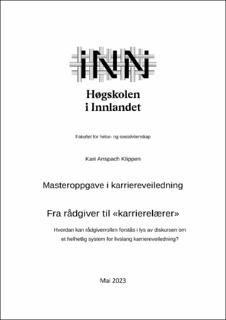| dc.contributor.advisor | | |
| dc.contributor.author | Kari Anspach Klippen | |
| dc.date.accessioned | 2023-07-06T16:10:21Z | |
| dc.date.available | 2023-07-06T16:10:21Z | |
| dc.date.issued | 2023 | |
| dc.identifier | no.inn:inspera:148100654:99390648 | |
| dc.identifier.uri | https://hdl.handle.net/11250/3076691 | |
| dc.description.abstract | Livslang karriereveiledning er ikke et nytt fenomen i norsk sammenheng. Med påvirkning fra overnasjonale sammenslutninger som OECD og EU, har det de siste tiårene blitt satset på et helhetlig system for livslang karriereveiledning som skal gjøre befolkningen bedre i stand til å møte kravene i et samfunns- og arbeidsliv i stadig endring (Kjærgård, 2018, s.32). I dette ligger det en forståelse av at det å håndtere sin egen karriere er noe som må læres – ikke bare for å kunne ta det store og viktige yrkesvalget en gang i livet, men for å være forberedt på omstillinger, overganger og den usikkerheten som mest sannsynlig vil prege fremtiden for den enkelte, både med tanke på arbeid og i livet ellers.
Denne masteroppgaven handler om hvordan livslang karriereveiledning gjør seg gjeldende i ungdomsskolen. I den sammenhengen rettes det særlig et fokus mot hvordan rådgiveren forstår sin rolle som karriereveileder i møte med elevene, samt hvordan rådgiveren kan bidra til at elevene får den karrierekompetansen de trenger for å takle karriererelaterte utfordringer gjennom livsløpet (NOU 2016:7, s.50).
Med utgangspunkt i NOU 2016:7 gjennomfører jeg en kritisk diskursanalyse for å avdekke hva som ligger bak det økende behovet for et helhetlig system for livslang karriereveiledning. Det overordnede spørsmålet i analysen er med andre ord; dersom et helhetlig system for livslang karriereveiledning er løsningen, hva er det da som er «problemet»? Carol Bacchis WPR-analyse (What’s the problem represented to be) som jeg har valgt som metode i oppgaven, henter inspirasjon fra Michel Foucaults diskursteori (1970) og hans poststrukturalstiske tenkning (Kjærgård, 2012, s.30). I Foucaults ånd åpner WPR-analysen for muligheten til å stille kritiske spørsmål til «vedtatte sannheter» om karriereveiledning (Foucault, 1991, i Bacchi, 2009, s.35). På et mer overordnet nivå i oppgaven tar jeg utgangspunkt i Ronald G. Sultanas tre grunnleggende diskurser om ligger til grunn for karriereveiledning i praksis (Sultana, 2018, s.41). De tre diskursene er basert på henholdsvis en teknokratisk tilnærming, eller samfunnsøkonomisk effektivitet, en utviklingsrettet og humanistiske tilnærming, og en sosialrekonstruktivistisk eller frigjørende tilnærming (Sultana, 2018, s.40). I analysen av NOU 2016: finner jeg i hovedsak en diskurs som retter seg mot samfunnsøkonomisk effektivitet, men jeg tar også til orde for at den humanistiske tilnærmingen er til stede.
Med utgangspunkt i funn fra analysen drøfter jeg hvordan rådgiveren kan forstå sin rolle i et helhetlig system for livslang karriereveiledning. I den sammenhengen pekes det på tre sentrale elementer som fremtrer som viktige knyttet til forståelsen av rådgiverrollen. De tre elementene er kritisk refleksjon, karrierelæring og etisk bevissthet. | |
| dc.description.abstract | Lifelong career guidance is not a new phenomenon in the Norwegian context. With the influence of supranational associations such as the OECD and the EU over the last few decades there has been a commitment to a comprehensive system of lifelong career guidance that will enable the population to meet the demands of an ever-changing social and working life (Kjærgård, 2018, p.32). In this there is an understanding that managing one’s own career is something that must be learned – not only to be able to make the big and important career choice once in a lifetime, but to be prepared for changes, transitions and the uncertainty that will most likely characterize the future of the individual, both in terms of work and in life otherwise.
This master’s thesis is about how lifelong career guidance applies in secondary school. In this context, a particular focus is placed on how the advisor understands his/her role as a career supervisor in meeting with the students, as well as how the advisor can contribute to students gaining the career skills they need to handle career-related challenges throughout the life cycle (NOU 2016:7, p.50).
Based on NOU 2016:7, I am conducting a critical discourse analysis to uncover what is behind the growing need for a holistic system for lifelong career guidance. In other words, the overall question in the analysis is; if a holistic system for lifelong career guidance is the solution, what is the “problem”? Carol Bacchi's WPR-analysis (What's the problem represented to be) which I have chosen as a method in the task takes inspiration from Michel Foucault's discourse theory (1970) and his poststructural thinking (Kjærgård, 2012, p.30). In Foucault’s spirit, the WPR analysis opens up the opportunity to ask critical questions about “adopted truths” about career guidance (Foucault, 1991, in Bacchi, 2009, p.35). At a more senior level in the task, I am starting from Ronald G. Sultana’s three fundamental discourses which underlie career guidance in practice (Sultana, 2018, p.41). The three discourses are based on a technocratic approach, or socio-economic efficiency, a developmental and humanistic approach, and a social-reconstructive or liberating approach, respectively (Sultana, 2018, p.40). In the analysis of NOU 2016:7 I mainly find a discourse that targets socio-economic efficiency, but I also advocate that the humanistic approach is present.
Based on findings from the analysis, I discuss how the role of advisors can understand their role in a holistic system of lifelong career guidance. In this context, three key elements appear to be important related to the understanding of the advisor role are pointed out. The three elements are critical reflection, career learning, and ethical awareness. | |
| dc.language | nno | |
| dc.publisher | Inland Norway University | |
| dc.title | Fra rådgiver til "karrierelærer" | |
| dc.type | Master thesis | |
